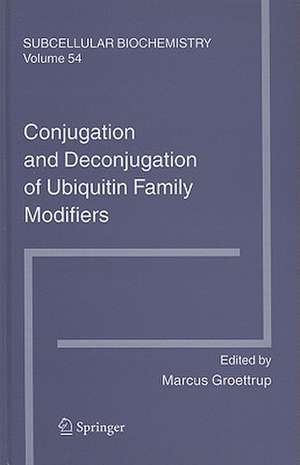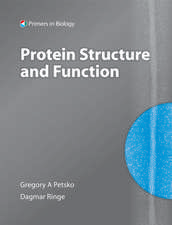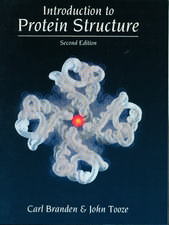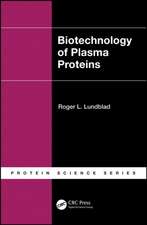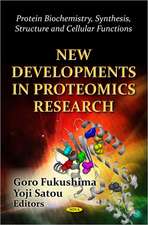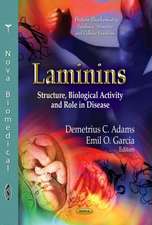Conjugation and Deconjugation of Ubiquitin Family Modifiers: Subcellular Biochemistry, cartea 54
Editat de Marcus Groettrupen Limba Engleză Hardback – 20 aug 2010
| Toate formatele și edițiile | Preț | Express |
|---|---|---|
| Paperback (1) | 946.72 lei 6-8 săpt. | |
| Springer – 23 aug 2016 | 946.72 lei 6-8 săpt. | |
| Hardback (1) | 948.79 lei 3-5 săpt. | |
| Springer – 20 aug 2010 | 948.79 lei 3-5 săpt. |
Din seria Subcellular Biochemistry
- 5%
 Preț: 1456.88 lei
Preț: 1456.88 lei - 18%
 Preț: 1373.84 lei
Preț: 1373.84 lei - 18%
 Preț: 1243.78 lei
Preț: 1243.78 lei - 18%
 Preț: 2098.81 lei
Preț: 2098.81 lei - 18%
 Preț: 1122.10 lei
Preț: 1122.10 lei - 5%
 Preț: 1160.63 lei
Preț: 1160.63 lei - 18%
 Preț: 1396.26 lei
Preț: 1396.26 lei - 18%
 Preț: 1114.96 lei
Preț: 1114.96 lei - 18%
 Preț: 1224.68 lei
Preț: 1224.68 lei - 18%
 Preț: 951.29 lei
Preț: 951.29 lei - 18%
 Preț: 1227.99 lei
Preț: 1227.99 lei -
 Preț: 398.15 lei
Preț: 398.15 lei -
 Preț: 399.88 lei
Preț: 399.88 lei - 18%
 Preț: 1231.47 lei
Preț: 1231.47 lei - 18%
 Preț: 1230.35 lei
Preț: 1230.35 lei -
 Preț: 392.60 lei
Preț: 392.60 lei - 18%
 Preț: 1231.47 lei
Preț: 1231.47 lei - 15%
 Preț: 638.76 lei
Preț: 638.76 lei - 5%
 Preț: 656.26 lei
Preț: 656.26 lei -
 Preț: 389.49 lei
Preț: 389.49 lei - 5%
 Preț: 659.19 lei
Preț: 659.19 lei -
 Preț: 392.37 lei
Preț: 392.37 lei - 5%
 Preț: 662.09 lei
Preț: 662.09 lei -
 Preț: 395.09 lei
Preț: 395.09 lei - 5%
 Preț: 667.99 lei
Preț: 667.99 lei -
 Preț: 400.47 lei
Preț: 400.47 lei - 18%
 Preț: 1224.54 lei
Preț: 1224.54 lei - 15%
 Preț: 647.73 lei
Preț: 647.73 lei - 15%
 Preț: 646.75 lei
Preț: 646.75 lei - 5%
 Preț: 662.30 lei
Preț: 662.30 lei -
 Preț: 395.25 lei
Preț: 395.25 lei - 18%
 Preț: 1230.21 lei
Preț: 1230.21 lei - 18%
 Preț: 1231.95 lei
Preț: 1231.95 lei - 18%
 Preț: 964.54 lei
Preț: 964.54 lei
Preț: 948.79 lei
Preț vechi: 1157.06 lei
-18% Nou
Puncte Express: 1423
Preț estimativ în valută:
181.55€ • 190.06$ • 150.22£
181.55€ • 190.06$ • 150.22£
Carte disponibilă
Livrare economică 17-31 martie
Preluare comenzi: 021 569.72.76
Specificații
ISBN-13: 9781441966759
ISBN-10: 1441966757
Pagini: 272
Ilustrații: XX, 252 p.
Greutate: 0.54 kg
Ediția:2010
Editura: Springer
Colecția Springer
Seria Subcellular Biochemistry
Locul publicării:New York, NY, United States
ISBN-10: 1441966757
Pagini: 272
Ilustrații: XX, 252 p.
Greutate: 0.54 kg
Ediția:2010
Editura: Springer
Colecția Springer
Seria Subcellular Biochemistry
Locul publicării:New York, NY, United States
Public țintă
ResearchCuprins
Activation of Ubiquitin and Ubiquitin-Like Proteins.- Control of Ubiquitin Conjugation by Cdc48 and Its Cofactors.- Regulation of Ubiquitin Receptors by Coupled Monoubiquitination.- Control of Cullin-Ring Ubiquitin Ligase Activity by Nedd8.- Control of Deneddylation by the COP9 Signalosome.- Mechanism, Specificity and Structure of the Deubiquitinases.- Ubiquitin Conjugation and Deconjugation in NF-?B Signaling.- Functions of Linear Ubiquitin Chains in the NF-?B Pathway.- Assembly of K11-Linked Ubiquitin Chains by the Anaphase-Promoting Complex.- Ubiquitin Family Members in the Regulation of the Tumor Suppressor p53.- Ubiquitylation in the ERAD Pathway.- Pupylation.- Sumo Control.- The In Vivo Functions of Desumoylating Enzymes.- Regulatory Functions of Ubiquitin and SUMO in DNA Repair Pathways.- Sumoylation as a Signal for Polyubiquitylation and Proteasomal Degradation.- In Vivo Functions of Isgylation.- Identification and Validation of ISG15 Target Proteins.- FAT10.
Notă biografică
MARCUS GROETTRUP is a Professor for Immunology in the Department ofBiology of Konstanz University in Germany. His main interests are in the role of the immunoproteasome in antigen fragmentation and autoimmunity. Moreover, he has studied the function and conjugation of the ubiquitin‑like protein FAT10. He studied biochemistry in Tübingen and ET H Zürich and did his diploma thesis in the laboratory of H. Hengartner and R. Zinkernagel. During his PhD at the Basel Institute for Immunology with H. von Boehmer he discovered the pre T cell receptor. After habilitation at Humboldt University Berlin in the group of P‑M. Kloetzel on the topic of antigen processing he founded his own group at the Cantonal Hospital St. Gallen, Switzerland. Since 2002 he holds the Chair of Immunology at the University of Konstanz, Germany. Several prizes were awarded to Dr. Groettrup like the Award of the Sandoz Foundation for Therapeutic Research, the Karl Lohmann Prize of the German Society for Biological Chemistry, the Langener Science Prize of the Paul Ehrlich Institute, and the Research Award by the CaP CURE foundation.
Caracteristici
Focussed on the modifiers ubiquitin, SUMO1/2/3, NED 8, ISG15 and FAT10 Discusses how conjugation enzymes determine specific linkages and how they are interpreted by ubiquitin binding domains Cross-talk between the ubiquitin family modification systems
